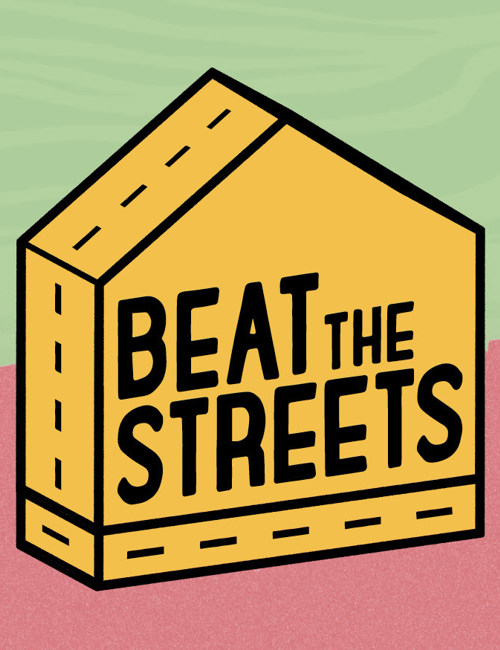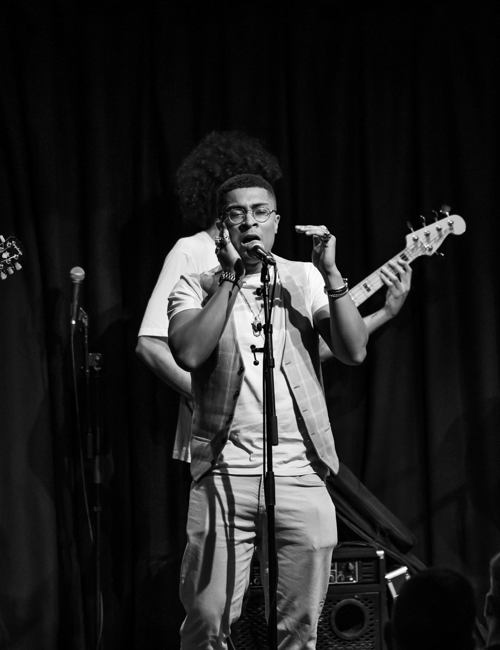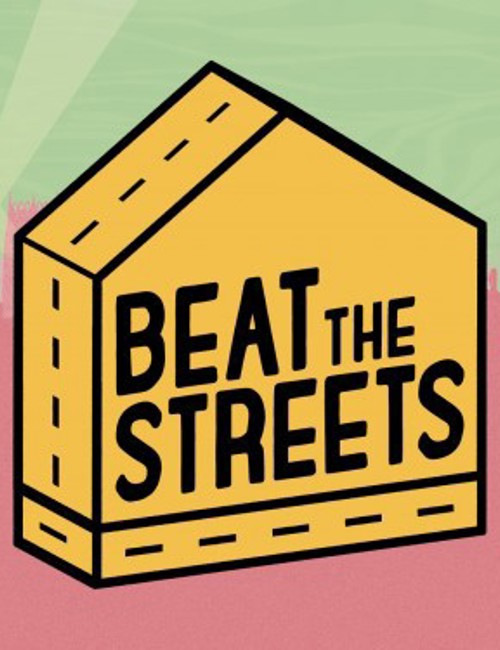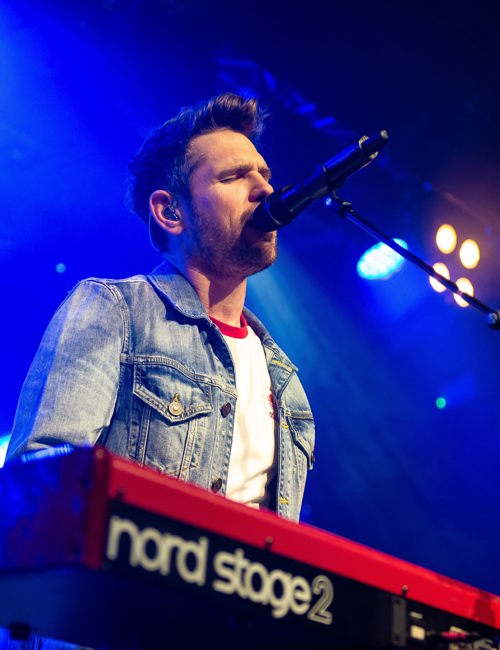Our writer Ria was thrilled - and a little nervous - to speak with Alabama 3 frontman Rob Spragg following the band's triumphant Rescue Rooms show. But nerves were quickly put aside as the conversation turned to nicknames, storytelling and The Sopranos...

Would you believe it if I told you I interviewed the guy who sang The Sopranos' theme song?
Would you?
Well - yes. Yes, I did.
But Alabama 3, and their frontman, Rob Spragg (that’s Larry Love to you music-lovers), are more than just the bluesy crooners you’d hear in every Soprano episode. No, Rob Spragg and his Church herald an impressive feat, fusing two of music’s most unlikely genres: country blues and acid house, creating a sound that is as strange as it is alluring.
Self-described as a “a pop band, a punk rock, blues and country techno situationist crypto-Marxist-Leninist electro band,” Alabama 3 do their best in not being boxed. In our chat, Spragg spoke candidly about how the band’s sound transgresses the mainstream, serving as a rich and vibrant example of music sampling and experimentation done successfully. With so much to touch on, I was more than happy to speak to the man behind the madness.
I was also, admittedly, a little apprehensive. The opening shot on my Zoom screen featured a Spragg decked out in these cool, dark shades, cigarette in hard: calm, composed - an air of mystique enshrouded him. I expected nothing less from the frontman of a band known for their razor-sharp satire and refusal to shy away from the world’s darker truths.
However, all nerves soon settled after Spragg informed me of his plans to treat himself to a post-interview Spoons trip. I asked him his go-to order - a little ease into the conversation before I plagued him with the goods. His answer? “It’s either the bangers and mash, or fish(es) and chips” - couldn’t really fault that, nice one Rob!
With the pleasantries out the way, we cracked on with what I really came here for: to pick Spragg’s brain. My first question of choice was perhaps the most expected one. You see, for context, Alabama 3 have a list of aliases - you’ve gotta remember that Rob is not known as ‘Rob’ when it comes to his musical career. Oh no. He’s Larry Love. The late Jake Black? The Very Revered Dr. D. Wayne Love. Then there’s The Spirit (of Love) and Harpo Strangelove, alongside many others. So naturally, my first question was getting to the crux of it all - how did Alabama 3 truly come to be?

Ria: What really stood out to me about Alabama 3 is that every member has an alias, which I thought was really, really cool. I wanted to ask if you could talk me through some of them and how they all came about?
Rob: Yeah, we used to do acid house parties (like warehouse parties), and there was this DJ called DJ Parrot who’s a very good friend of mine, and there used to be a gay club called LoveMuscle on in Brixton. One day, we was in Italy and before we got back, he said, “you’re f*****g nothing but Larry LoveMuscle” and I goes, “that’s a good name Larry LoveMuscle,” and then we went, we’ll form this kind of weird cult, right? Follow the First Presbyterian Church of Elvis and then we might as well have a Reverend - so we have Reverend D. Wayne Love who was originally Jake Black, we’d Orlando Harrison who became The Spirit of Love cos he played the keyboards; we got Rock Freebase (Mark Sams) who joined a bit later and he had a really bad temper on him so we just gave him a really horrible name like Rock Freebase; the Mountain of Love just because he was a bit of a lump; L B Dope, the drummer (half a pound of dope)… we got Harpo Strangelove - Nick Reynolds, the Great Train Robber’s son.
We came up with Alabama 3 so we thought we might as well take it a stage further and give ourselves stupid names.
Ria: I love it though. It’s kind of like your own little cult?
Rob: Yeah, that’s what we tried doing but a lot of the press at the time just thought we were taking the p*** with it - “I’m not gonna call you Larry Love your name’s Rob.”
Ria: That’s what makes you stand out! I like how it’s all tied in, everyone’s got very similar names…
Rob: (smiling) Well you’ve hit the nail on the head, we definitely went for that weird cult-y approach to name-calling y’know what I mean but I’m a grown man now like I’m 60 years old called Larry LoveMuscle...
Ria: It was Nick Reynolds that was related to Bruce Reynolds, the Great Train Robber? Talk me through that...
Rob: Yeah, that’s a true fact. People don’t believe that but yeah (jokingly) he got in the band cos of the robbery connection...mould him into the role. Now he plays the room like a f*****g madman.
Ria: I wanted to bring up your fusion of sounds - acid house meets country-blues. How did you come up with such an eclectic sound? Did you ever feel like outsiders mixing the sounds of the Deep South with British rave culture?
Rob: Yeah, well it took a long time for anyone to take it seriously, I was playing around making acid records in 1989/90 and then we started mixing in old blues and country samples and it kinda worked for us but no one at the time liked it, and thought we were just a novelty act. I suppose as well that we all met in Brixton which is a real kind of multicultural part of London, and you can walk out of an Irish pub and listen to a steel band playing on the corner and then you walk into grime doing all that. I think that really encouraged us to experiment with such extremities of stylisation.
I remember we were signed to Sony in America once and this A&R man said to me, “Rob, Ricky Martin has sold 25 million copies of ‘Livin’ la Vida Loca’ last week, you sold 38 copies of your album statewide.”
I said, “what do you mean?” and he said, “you’re very problematic, we cannot put you in any category - we don’t know whether to put you as a dance act, a country act, a kind of rock’n’roll act.” It's given us problems over the years, but I think we stood the test of time because we’re stubborn idiots.

Ria: But isn’t that your niche, you not being able to be placed into one box, surely that sets you apart?
Rob: I think we were ahead of the game. I mean kids are doing that all the time, mixing stuff up they’ve never heard of. The way young musicians can just splice styles up is just amazing and I think we - I’m not saying we were the forefathers cos lots of people were doing it but we kind’ve stood the test of time and developed over the years the same kind of stupid agenda and it kinda works y’know?
Ria: I’m a massive blues fan myself and your hit classic Woke Up This Morning had that Howlin Wolf sample on there?
Rob: Yes, Howlin Wolf sample on it, Muddy Waters, we’ve got four blues samples on it which at the time cost us an arm and a leg. Because I wanted to honour the blues players but then I realised they didn’t even own the copyright. It was owned by Japanese bureaucrats - consortium of Sony or something y’know what I mean. You got to be careful...
Ria: And it ended up being such a smash hit! Because the song was used in The Sopranos, do you feel like its meaning was perhaps overshadowed by its association with the show?
Rob: Maybe. I spoke to David Chase, the writer, and said he really liked the line, “I woke up this morning and got myself a gun, mama always said you’d be the chosen one” and in The Sopranos there’s a lot of father-mother hostility and kind of weird love between Tony and his mum. So, for David Chase, it made perfect sense for him. Don’t forget we weren’t even credited for The Sopranos, so people didn’t even know who did it. For many years people thought Leonard Cohen had done it. So I’ve never seen it as clouding the issue or not. I just think it adds another element of interest to the song because some people think I wrote it specifically for The Sopranos and it was picked up. I wrote it like eight years before that, so that’s quite interesting. It was a song about female empowerment and turned into a gangster anthem.
Ria: The show’s getting popular again. Do you feel like you’re getting a resurgence because it’s everywhere at the moment?
Rob: Well, Covid was really good for Alabama 3 because The Sopranos boxset was one of the most watched box-sets, so we were in people’s homes. They couldn’t even leave their homes and had to listen to it! But yeah, I'm really proud to be associated with a show of that calibre - it’s not hurt us at
all.
Ria: If Tony Soprano didn’t have Woke Up This Morning as his theme song, what Alabama 3 song do you think you would give to him?
Rob: Maybe a song called Peace in The Valley, cos the chorus goes “But there's gonna be peace in
the valley tomorrow, Lord, 'cos tonight she's gonna blow it all away, she feels so twisted, she ain't ever
gonna fix it..."

Ria: Looking back on the aliases of the group, and how you all portray yourselves - the stage names, the personas, the blurring between reality and performance - how much of your on-stage presence is really you?
Rob: Well over the years I can’t really tell y’know? Particularly when I’m on tour, the personalities kind of merge and everyone becomes kind of their assumed character. It only takes about two days, and I go from Rob, half-caring father to a psychopathic f*****g lead singer, d’you know what I mean? I mean, Bowie was always great at that…if you put yourself out on stage you can choose any identity you want, and it depends whether you use them responsibly or not. And you can have a laugh with it. It allows you to have a lot more kind of personality disorders without being thrown out the band.
Ria: Your lyrics focus on a lot of themes such as crime and redemption. Do you view yourselves as storytellers or do the messages come from personal experiences? What is the inspiration for you and the band?
Rob: Bob Dylan said, “to live outside the law, you must be honest” and I think there’s always been an underbelly of, shall we say, crime and jazz and crime and punk? Music is littered with dodgy characters of the ages, some very nasty people involved in rock’n’roll in the business end of it. Also I was a drug councillor at the time, and I got a lot of awful interest in dealing with the margins of society - a lot of blues and country comes out of that, and you look in strange places for inspiration.
I’m quite happy sitting in a pub with old Jamaicans and picking up on some of their stories and that inspired it all. We do lots of work in youth clubs working with kids who came from gang crime - they’re always inspiring. There’s nothing worse than being a songwriter when you’re just sitting on your arse and waiting for this divine inspiration to come - you gotta go out on the street and get your hands dirty. But hopefully it is done, when we write with some compassion, y’know? You have to have some understanding of the characters you write about otherwise you can come across as patronising.
I think lived experience is the best, and that’s not me admitting to low-life behaviour, it definitely comes from some direct experience of the streets. I mean we live in Brixton, our studio is right in the middle of Brixton - we’ve been here for 30 years so we are surrounded by interesting characters. I don’t have to go far.
Ria: Your discography explores many themes, looking at outsider culture and radical politics. Has there been a point, maybe in a song or album, where you’ve thought “Maybe we've pushed this a bit far?” For instance, you’ve written about on police brutality with Police on my Back and then you’ve done the Woody Guthrie song. Have you ever dealt with any pushback from people from higher places?
Rob: Woody Guthrie came out when there was a lot of racism and xenophobia going on about and there’s a section in there we go “sing a song for the asylum seeker for the frightened baby on some foreign beach, you better bang a gong and pray they reach safe harbour.” We did some anti-racism gigs, and all these skinheads had turned up and they got the totally wrong end of the stick and thought we were kind of fascists - we had a couple of rows with them. I’m not sure if we’ve had any kickbacks, we’ve been banned from the radio a few times but that’s the way it rolls.
Ria: If Alabama 3 were a religion, what do you think its core tenets would be?
Rob: Listen to Elvis Presley at least once a week. Listen to Wu Tang Clan once a week. Be nice to your parents. Don’t be homophobic, racist or sexist.
Ria: That’s a very good religion. I think I’d ascribe to that religion - you’d get a lot of followers for that I’d imagine.
Rob: Yeah, Elvis, Wu-tang and f******g positivity -
Ria: Okay, what about if the band were televangelists for a day, what would your sermon be? What would you preach to the people?
Rob: It’s time to get off your Zoom meetings, to get off your phones and get in a room together, drink
a load of blue Aftershocks and have a singsong.
Ria: OK, last two questions and I’ll let you have your Spoons food! If Alabama 3 were to start a revolution, what would be the first law you'd put in place?
Rob: First law we’d have in place? Hm…make the reading of Virginia Woolf compulsory. Sylvia Plath should be compulsory reading in all schools.
Ria: And if Alabama 3 were a cult, what would be the initiation ritual?
Rob: We’ve actually got one! It’s basically you get up on stage and go “love me tender, love me true,
all my dreams fulfil. For my darlin', I love you, for my darlin', I love you, and I always will, and I
always will,” and then you’re married then to the Church via the First Presbyterian Church of Elvis
the Divine. You just repeat after me the Love Me Tender lyrics of Elvis and then you’re in the cult.
Ria: You don’t dress as Elvis, do you?
Rob: I have dressed as Elvis, yeah, for the 20th anniversary of Exile on Coldharbour Lane tour, I did
dress up as Elvis.
My closing remarks from our natter? Well, I found Rob to be quite the charmer. Just your everyday relatable bloke you’d see in your local pub, with the most outlandish and unbelievable stories, and I think that’s what made this interview even more enjoyable. A chinwag with a man who has done and seen it all. To hear the man recount fondly of all the past memories and relationships he’d accumulated over the years, felt like quite the privilege. This is a man who knows what he is about and sticks to it. A craftsmen of rebellion and born disruptor of the status quo, it is this which truly makes Spragg the beating heart of rock’n’roll.
You can read our review of Alabama 3's Rescue Rooms show here.

We have a favour to ask
LeftLion is Nottingham’s meeting point for information about what’s going on in our city, from the established organisations to the grassroots. We want to keep what we do free to all to access, but increasingly we are relying on revenue from our readers to continue. Can you spare a few quid each month to support us?




